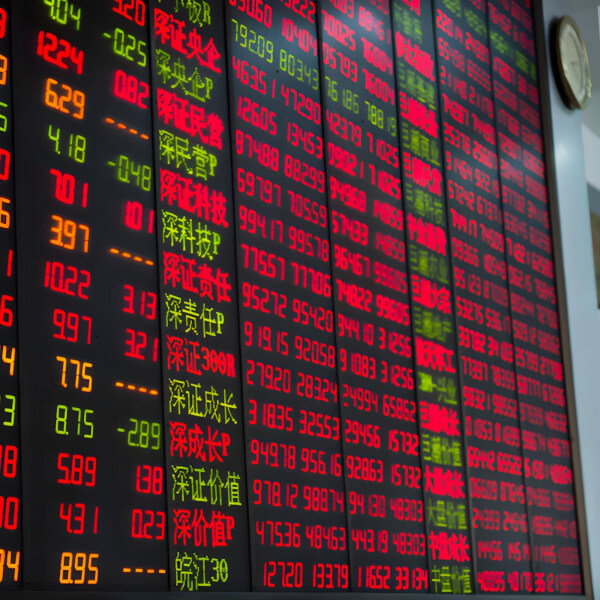- Nasdaq 100 falls below 18,500 points.
- Tesla erases yesterday's gains.
- Stock sell-off by Nvidia CEO reinforces company's declines
Today's session presents strongly negative investor sentiment towards the US technology segment. The Nasdaq 100 is losing more than 2%, and declines are dominating among US Big Tech stocks. All of the companies in the so-called “Magnificent Seven” are losing today, led by Tesla, which is down more than 5% today.
The US100 contract is trading down about 2.4% today, slipping below the psychological barrier of 18,500 pts, further reinforced by the March consolidation zone and the local May lows. Quotations reacted with a similar range of repricing as after the NFP data for July, which led to an even bigger drop in the contract's price below 18,000 points. The data for August do not look as bad as the previous ones, hence the range of declines may be smaller than during the last downgrade. At the same time, looking at the general trends in sentiment toward technology companies for the time being, we can see a strong retreat from the zone of euphoric sentiment seen among investors in the first half of this year. Source: xStation
The U.S. electric car maker today erased completely the gains the company's stock price made yesterday following news of the planned introduction of FSD (Full Sefl Driving) technology in Europe and China by the end of 2025. The company's stock price has been weighed down since April by investors' expectations of the Robotaxi presentation, which is expected to be a step towards Tesla's transformation more into a technology company than a car manufacturer, something that has long been at the core of Elon Musk's thinking. Hence, investors' expectations for the new technology are so high that the company lost nearly 6% in a single session in July just on news of the potential postponement of the Robotaxi presentation. Investors are now looking forward with great uncertainty to October 10, when Tesla is expected to unveil its new product.
With current P/E values of 108.4x and P//E forward 77.7x indicating huge investor expectations about the company's potential to monetize future technologies, the stock faces additional volatility as we approach the key presentation day. It's worth noting that, for now, market consensus is pricing in a significant slowdown in revenue growth in 2024 and 2025 (to 2.8% and 17%, respectively), which compares to average annual growth for the past three years of 34%, which pales quite a bit with such high multiples values. The long-term perspective of new technologies may provide latent potential for significant improvement in these dynamics, but in the shorter term, the high relative valuation exposes the company to significant fluctuations.
Nvidia is also seeing stronger declines today, losing nearly 5%. The company has already completely wiped out its August gains and is approaching the psychological barrier of $100 per share. This level is set by the opening of trading after the company's 1Q24 report in May, when the company began its subsequent rally to historic highs. Since then, Nvidia's stock price has only fallen below this mark once during the market panic of early August this year as a result of NFP data suggesting a potential recession. Today's Nvidia declines are also reinforced by news regarding the CEO's sell-off of the company's shares. Since June, Jensen Huang has sold nearly 5.3 million shares in 120,000 tranches. These sales follow a plan published in March of this year to automatically sell shares if certain market conditions, such as volume or price, are met.
Nvidia's stock price is approaching the psychological level of $100 . Source: xStation
The sentiment of technology companies is also being weighed down by Broadcom's results. While the number for 2Q were not too bad, the company disappointed investors when it came to its forecasts for the whole 2024. For the market, the raising of revenue expectations for AI products to $12 billion from $11 billion earlier this year is the first sign of a potential exhaustion of the “latent” potential among AI-related companies, which allowed them to regularly beat not only their previous years' results, but also the market consensus. Of course, one single company's forecast is not enough to draw far-reaching conclusions about the state of the entire sector, however, growing concerns about the future of one of the leading microchip manufacturers in the US can be read in today's decline.
The negative sentiment does not, of course, apply to all technology companies. Samsara, a company that combines physical operations data with its IoT (Internet of Things) tools, reported significantly higher financial results than expected. In 2Q24, the company generated revenues of $300 million, up 37% year-on-year and maintaining the strong momentum of previous quarters. At the adjusted earnings per share level, the company presented $0.05, beating consensus expectations by 5 times. As a result, the company's stock price is up more than 15% today.

Daily summary: The beginning of the end of disinflation?

Block Inc. lays off 40% of its workforce and rises 16% - Is this a new paradigm?

US Open: Rising oil and PPI pressure Wall Street 📉 Technology and financial stocks drop

Dell surges 12% amid AI driving 40% revenue growth 📈


